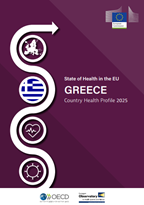HSPM
Health Systems and Policy Monitor

Greece offers universal coverage for health care. The National Organisation for the Provision of Health Services (EOPYY) was established in 2011 to manage a single, unified health insurance fund and to act as the sole purchaser for publicly funded health services delivered by the National Health System (NHS).
Private providers are also contracted by EOPYY, mainly to deliver primary and outpatient care and diagnostic services. The Ministry of Health is responsible for the extensive regulation of the entire system. Health system plans have envisaged regional authorities playing an increasing role in coordinating primary care; however, in practice, they are currently under-resourced for this role.
Over the last 20 years, health care expenditure from public sources has typically ranged between 60 and 65% , whereas one third of health spending has been financed by households out of pocket (consistently one of the highest rates in the EU). In addition, informal payments are estimated to represent a considerable share of out-of-pocket payments, and act as a barrier to accessing health care services.
The Greek health care system is strongly centred on hospitals and therefore the development of primary care has become a prerequisite for improving efficiency and access. Since 2017, an integrated primary care system has gradually been rolled out through the establishment of smaller local health units and larger health centres. A gate-keeping function, whereby residents should register with a personal physician who will guide them through the health system (or incur extra payments for NHS services) was established in 2022.
Subscribe to our newsletter
Sign Up